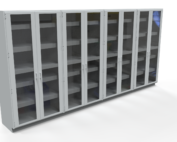
Polypropylene casework has been the specialty solution for laboratories all over the world. This material offers extreme levels of resistance in corrosive environments. In some laboratories and research centers, polypropylene is the only option. It is commonly fabricated from stress-relieved CP-5 (UL 94 V-0) or CP-7D (FM 4910 Listed) plastics.
Polypropylene cabinets are ideal for a wide variety of laboratories and settings, including:
- Trace metal analysis
- Water treatment facilities
- Metallurgy
- Marine science
- Waste management
- Material science
- Environmental toxicity analysis
- Toxicology
- Chemical engineering
- Acid digestion
- Soil science
Unlike metal cabinets and casework, poly will never rust. It is also durable and stain-resistant. All hardware, pulls, latches and hinges can be made from polypropylene. Polypropylene, Epoxy or Phenolic tops can be used as a worksurface for maximum durability and chemical resistance.
Cabinets and casework are constructed with ½ to 1 inch thick sheets. A special process is used to thermally weld the joints. This helps create a tight seal and ensures high strength. White polypropylene is the most common color, but black and natural are also available.
Base cabinets can be designed to contain plumbing, sinks and electrical as needed.
What is Polypropylene?
Polypropylene is a rigid and crystalline thermostatic produced from propene (or propylene) monomer. The material is useful for various applications requiring corrosion resistance, including laboratory casework. It is one of the most produced plastics today, with applications in the automotive, industrial, consumer goods and furniture industries.
What are the Properties of Polypropylene?
Chemical resistance: Polypropylene doesn’t break down easily, making it a great choice for liquid containers. However, oxidizing acids, chlorinated hydrocarbons and aromatics can break down the material.
It is also not rated to withstand some chemicals at high or low temperatures, such as dibutyl phthalate and chlorosulfonic acid.
Water Resistance: Polypropylene is highly impermeable to water.
Elasticity, flexibility, and toughness: Polypropylene is resistant to cracking and stress.
High Melting Point: 327°F (163.8°C).
Environmentally friendly: Can be recycled and reused. It produces less solid waste by weight.
Benefits of Polypropylene Cabinets & Casework
Benefits of Polypropylene Casework
- No rust or corrosion
- Metal-free
- Welded construction: A unique process thermally welds all joints. This process ensures leak-tight, superior strength, flush unions and seams.
Additional Design Features
- High performance, concealed, magnetic door latches
- Standard 3” handle pulls and flush mounted hinges
- Made from ½” stress relieved polypropylene
- Single piece precise fit drawers
- Single piece fully recessed hinges
- Removable access panels
- Optional soft close doors
Custom Fabricators
We Design, Build, Supply & Install Lab Casework.
CFI has over 60 years of experience in providing lab furniture, equipment, casework, millwork, tops and fixtures. From polypropylene and stainless steel, to the manufacture and distribution of products, we have solutions that will help you meet your laboratory design or remodel requirements.
Contact our experts to learn more about poly or get a quote.

